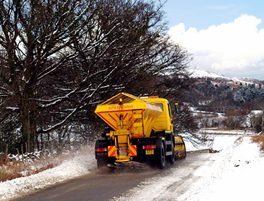Winter’s gone but the Environmental Impact Remain. It’s finally happening; the snow is melting and the sun is starting to shine. But have we really considered the cost of such a long and arduous winter?
No matter what organisation you are a part of, you will have notice some impacts of Britain’s extended winter. Whether it’s that you have seen the salt being spread on the ground every couple of days, or supplies running out quicker and delivery lorries struggling, or simply that everything seems to get dirtier quicker. Each of these things seem like normal day to day tasks, something that happens and you think no more about it. However, one of those everyday tasks can actually cause the largest Environmental problems.
Salt spreading: yes, it’s necessary. It provides safety to vehicles and pedestrians alike. But where does it go when the snow and ice has melted, or it didn’t appear in the first place? Largely, it will go into roadside drains and is carried off through the sewer system to be treated. No problem there. But it can also end up in natural waterways, such as ponds, rivers and lakes. That is a problem. High levels of salt (or it’s harsher relative “grit”) can cause massive problems for the wildlife that inhabit such waterways by poisoning the water and getting inadvertently eaten by the wildlife. It also depletes our natural resources of salt, which in the long term could cause problems for us all.
What you can do, however, is think a little harder on how, when and where you use salt or grit and what you do with it when the weather clears up. Firstly, do you need to spread as much as you do? It’s often the case that due to bad weather there are less people in the outside areas and less vehicles making journeys, so perhaps you could designate one pathway in and one pathway out for vehicles, a separate pathway in and out for pedestrians and have a few people regularly clear the routes with snow shovels. If you still need to, then only salt those particular routes. Obviously, the safety of vehicles and pedestrians come first, but you don’t need to salt the whole yard if you are only working in one half of it.
When you know bad weather is on it’s way, make sure you plan for it. Make sure everyone who needs to knows what each drain is and where it goes. Know where each drain is and where they lead to; is it a drain that goes to natural waterways or a drain that leads to a treatment facility? Likewise, make sure other essential people know this information too (i.e, anyone who has access to or works in the external premises). Check that melting snow and rainwater can make their way safely to a waste drain rather than a ditch or a stream, with no obstructions. Make sure the drain is not blocked and that the residual fluid can enter the drain and be carried away without overflowing. Finally, mark out the routes and pathways into, out of, and around your external premises and have a plan in place to only salt and clear those specific routes, not the entire place.
When the weather clears up, give your outside premises a good sweep, collect any residual salt and either store it for re-use or invest in a responsible way to dispose of it.
Finally, take precautions in the entrances to your premises. A wet floor sign is a must, but also have some mats or towels for employees and visitors to thoroughly wipe their feet on before they walk through the building. This helps prevent the salt being traipsed around the building, being mopped up and simply poured down the drain into clean waterways. It also means that if you’re lucky, you can collect some of the salt and store it for re-use next time winter comes around.
These little pointers can help your company do their bit to look after the Environment, and maybe ease the financial strain a bit too.
For more advice or information on achieving ISO14001 Environmental Management Systems, contact us through our website www.assentriskmanagement.co.uk.
For the latest news and legislation regarding Environmental matters, visit www.environment-agency.gov.uk
entry130402-155100


